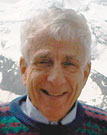

Peter Achinstein: Who Needs Proof? James Clerk Maxwell on Scientific Method
13 November 2014, 10:30 am - 12:00 pm EST
ABSTRACT
Isaac Newton famously claimed that hypotheses, i.e., unproved propositions, have no place in “experimental philosophy.” Maxwell disagreed and proposed three methods that can legitmately be employed when a scientist lacks proof for a theory, or even a theory to be proved. What are these methods, and are they legitimate?
SPEAKER PROFILE
Peter Achinstein specializes in philosophy of science and has interests in the history of science as well. In addition to numerous articles and reviews in these fields, he is the author of Concepts of Science (1968), Law and Explanation (1971), The Nature of Explanation (1983), and Particles and Waves (1991). The latter, which received the Lakatos Award, is a study of methodological problems arising from three episodes in 19th-century physics: the wave-particle debate about light, the development of the kinetic-molecular theory, and the discovery of the electron. Recent publications include The Book of Evidence (2001), which develops a theory of scientific evidence and applies it to cases in the history of science, Science Rules: A Historical Introduction to Scientific Methods (2004), Scientific Evidence (2005), and Evidence, Explanation, and Realism (2010), which is a collection of his essays. In 2011, he was honored by a festschrift, Philosophy of Science Matters: The Philosophy of Peter Achinstein. This contains 20 papers on his work by former students and other important writers. His latest work, Evidence and Method, which discusses the scientific methods of Isaac Newton and James Clerk Maxwell, will be published in 2013. He has held Guggenheim, NEH, and NSF fellowships, and has served as a visiting professor at MIT, Stanford, and the Hebrew University of Jerusalem. He is a founder and Director of the Johns Hopkins Center for History and Philosophy of Science.
Read more about Peter Achinstein.

